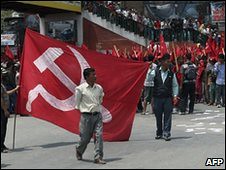
Communist Party of Nepal (Maoist) has ended the general strike after nearly a week. Clashes erupted between strike supporters and pro-business elements on May 6, 2010.
Originally uploaded by Pan-African News Wire File Photos
21:52 Mecca time, 18:52 GMT
Nepal Maoists end unpopular strike
About 35,000 people massed in the capital to demand an end to the Maoist-enforced shutdown
Nepal's former Maoist rebels have ended their general strike six days after it paralysed businesses and daily life in the Himalayan nation.
Friday's decision followed a rally attended by around 35,000 people in Kathmandu, the capital, who demanded an end to the shutdown.
The protest, organised by the business community and other civil society groups, was the biggest anti-Maoist demonstration since the former rebels launched the strike, which closed down factories, shops, banks and schools and halted all ground transport.
"We have decided to end the strike keeping in mind the difficulties the general people have had to face in these past days," Pushpa Kamal Dahal, the Maoist leader, said on Friday.
The Maoists would, however, proceed with other forms of anti-government protests until their demands for the government to step down were met, Dahal added.
"We will continue with our mass movement until May 28 - the deadline of the drafting of the constitution," he told reporters.
'Crippling strikes'
The Maoists, who hold about 40 per cent of seats in the 601-seat parliament, are pushing for the formation of a new national unity government under their own administration.
Experts said the group enforced the strike as a pressure tactic to return to power, which threatens Nepal's fragile peace process.
The United States had called on the Maoists to end the strike, voicing fear that the standoff could spiral into violence.
Robert Blake, the assistant secretary of state for South Asian affairs, encouraged all sides to try to resolve differences peacefully.
The Maoists gave up fighting government forces in 2006, ending a decade-long communist uprising that killed at least 14,000 people, before a peace deal was signed in 2006.
The left-wing group then won elections in 2008 before falling from power last year.
Consensus urged
Al Jazeera's Subina Shrestha, reporting from Kathmandu, said that Friday's protests had turned "violent when Maoists tried to stop people from attending the rally".
"The police were charging batons, shooting in the air and using tear gas shells in an effort to stop them [Maoists]."
At least five people were also wounded in the western town of Lekhnath, about 200km west of Kathmandu, when violence erupted over the strike.
The Maoists launched their challenge to the government - a loose coalition of 20 parties - ahead of May 28 when a new national constitution is expected to be drafted.
But legislators are likely to miss the deadline, leading to a possible political crisis.
"The prime minister needs to step down, and all parties must reach an agreement on how to move forward," Lok Raj Baral, chairman of the Nepal Centre of Contemporary Studies, a pro-democracy think tank, said.
"They must not forget that the constitution still needs to be written and the peace process brought back on track."
But the government has said it will not bow to the Maoists' demands.
Source: Al Jazeera and agencies
No comments:
Post a Comment